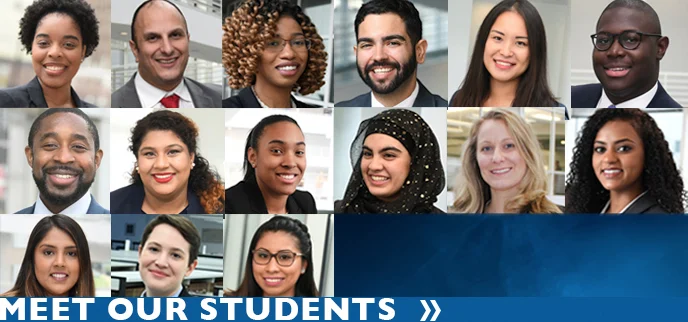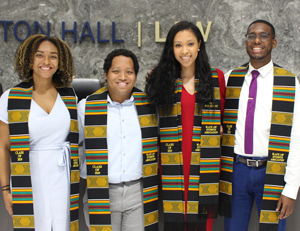
At Seton Hall Law School, diversity in all its forms is an essential part of who we are. We strive for diversity in thought, belief, and perspective as well as cultural, religious, ethnic, and gender diversity.
Our community is enriched when students from different economic and educational backgrounds and geographic regions come together to learn, analyze, and reform the law....

External pipeline opportunities include:
Diversity |
||
Overall Students of Color |
37.2% | |
| Asian American | 16.3% | |
| Black/African American | 4.5% | |
| Hispanic/Latine | 13.9% | |
| White/Caucasian | 58.0% | |
| Two or More | 2.4% | |
| Other/Not Reported | 4.9% | |
Female |
56.6% | |
Male |
42.7% | |
Age Range |
20-59 | |
First Generation College |
20.1% | |
First Generation Law |
78.8% | |
Military |
4 | |
LGBTQIA+ Identifying |
18.8% | |
Undergraduate Schools |
142 | |
States & Territories |
24 | |
Diversity Speaks Lecture Series
The Diversity Speaks lecture series was established in 2008 and is part of the Law School’s overall effort to promote a diverse and inclusive academic environment. Every year, Seton Hall Law School invites a distinguished member of the legal community to speak about their experiences in the profession and address the importance and value of diversity within the legal community. Past speakers include:
Cultural Competency Skill Building During 1L Year
In our growing multicultural society, cultural competency is increasingly important for those in the legal profession to create effective working relationships with their clients and adequately address their needs. The diverse backgrounds of both clients and attorneys can impact the quality of communication and the level of trust between them. As a result, cultural competency is important for the next generation of successful attorneys.
Cultural competency skill building is embedded in the First Year Lawyering Program Curriculum. This begins with an implicit bias training during 1L orientation. It continues with cultural competency exercises throughout the first-year lawyering program. The goal of this program is to underscore the importance of cultural competency skills for law students’ future careers as professionals working in our diverse society.
Community Conversations
Community Conversations are a series of discussions designed to inspire a sense of openness by providing a safe and stimulating format to discuss timely and challenging topics. The Office of Equity, Justice and Engagement hosts and guides these Community Conversations by often partnering with the Center for Social Justice and other student affinity organizations. Community Conversations consist of presentations, panel discussions, film screening with discussion and/or workshops.
Past Community Conversations have covered topics such as microaggressions, struggles of first-generation law students, race and mental health. The goal of Community Conversations is to encourage productive dialogue, foster a spirit of respect and appreciation, and provide practical approaches for cooperative action.
Diversity Banquet
The Diversity Banquet is an annual event that takes place each spring. This year-end celebration recognizes individuals who advance diversity in the New Jersey legal community and honors a speaker whose work is consistent with growth in diversity and excellence in the legal profession. The Diversity Banquet also raises funds to support student affinity organizations and awards scholarships to one deserving member from each of the student affinity organizations. The program consists of a keynote address, presentations by sponsoring student affinity organizations, an award ceremony and networking reception.
This is a great event for law firms, bar associations and public interest organizations dedicated to diversity, equity and inclusion in the legal profession, to sponsor. The Diversity Banquet is hosted by the Office of Equity, Justice and Engagement and various student affinity organizations. Each year tickets are available for purchase for the banquet. Table sponsorships and donations are also welcome.
